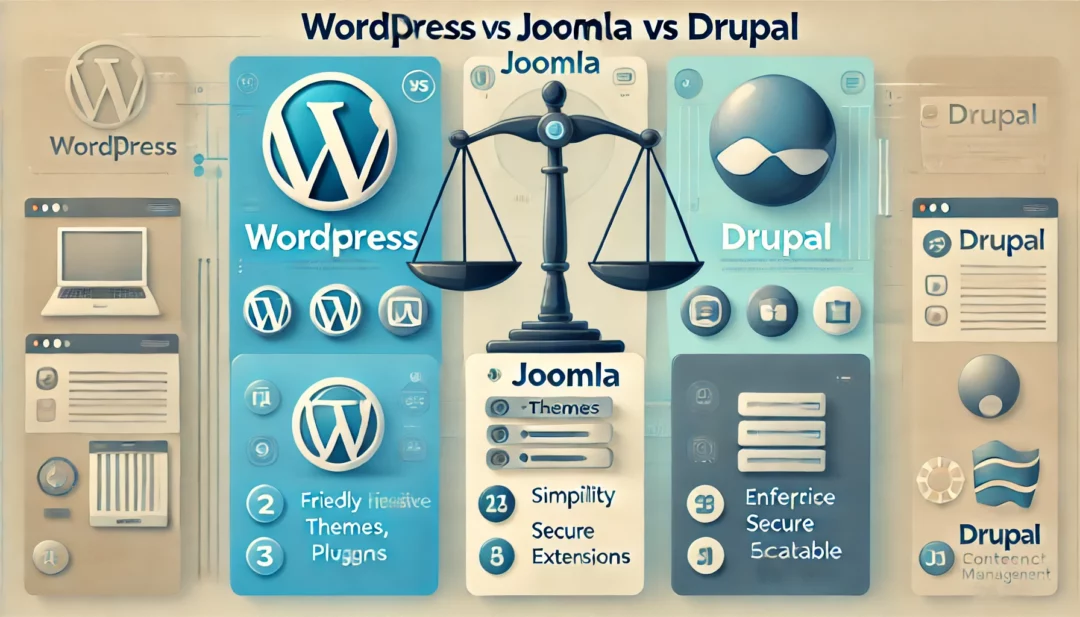
| Feature | WordPress | Joomla | Drupal |
|---|---|---|---|
| Market Share (2024/2025) | 43.6% of websites (62% CMS market share) | 1.6% of websites (2.3% CMS market share) | 0.9% of websites (1.3% CMS market share) |
| Ease of Use | Beginner-friendly, intuitive interface | Moderate; some technical knowledge required | Advanced; suited for developers and technical users |
| Customization | Extensive with thousands of plugins and themes | Moderate customization options with extensions | Highly flexible but requires coding expertise |
| Performance | Good for small to medium websites; scalable with optimization | Handles medium to large websites well | Best for complex, high-traffic websites |
| Security | Secure core, but vulnerabilities depend on plugins and themes | Strong security features; requires regular updates | Highly secure; often chosen for government and enterprise sites |
| SEO | SEO-friendly with plugins like Yoast | Good SEO tools available but less intuitive | Highly customizable for advanced SEO needs |
| Community and Support | Massive community with abundant resources | Strong community support but smaller than WordPress | Dedicated developer community with extensive documentation |
| Cost | Free core; costs for hosting, premium plugins, and themes | Free core; costs for hosting and extensions | Free core; higher costs for hosting and custom development |
| Best For | Small businesses, blogs, e-commerce, general-purpose websites | Community websites, medium-sized businesses | Large, complex websites requiring advanced customization |
Choosing the right Content Management System (CMS) is a critical decision. It can significantly impact the success of your website.
CMS platforms like WordPress, Joomla, and Drupal are popular choices. They each offer unique features and benefits. But how do you decide which one is right for you?
This comprehensive guide aims to help you make an informed decision. We’ll delve into the features, benefits, and drawbacks of each CMS. We’ll also compare them head-to-head to help you understand their differences.
WordPress is known for its user-friendly interface. It’s a favorite among beginners and bloggers. But it’s also powerful enough for more complex websites.
Joomla, on the other hand, offers a balance between complexity and ease of use. It’s flexible and customizable, making it a good choice for those with some technical skills.
Drupal is the most complex of the three. It’s ideal for large-scale, complex projects that require advanced features and functionality.
But choosing the right CMS isn’t just about features. It’s also about considering your specific needs and skill level.
Do you need a simple platform for a blog or small website? Or do you require a robust system for a large, complex site? Your answer will guide your choice.
Security, support, and maintenance are also important factors. Each CMS handles these aspects differently. We’ll explore these differences in detail.
Finally, we’ll provide a checklist to help you assess your needs. This will guide you in choosing the right CMS for your project.
Whether you’re a website owner, a blogger, a web developer, or a business owner, this guide is for you. Let’s dive in and explore the world of CMS platforms.
Understanding Content Management Systems (CMS)
A Content Management System (CMS) is a software application. It enables users to create, edit, manage, and publish content. The content can include text, images, videos, and more on a website. A CMS simplifies the process, allowing non-technical users to build websites with ease. It provides a user-friendly interface, typically through a browser-based dashboard.
CMS platforms offer various tools to customize a website. These include templates, plugins, and themes. They help personalize the design and functionality of the site. Users can modify layouts, add features, and change content without needing to code.
A CMS is crucial for collaboration. It allows multiple users to work on different parts of the website simultaneously. Some CMS platforms have built-in workflow management, ensuring smooth content creation and publication processes.
Moreover, CMS platforms often include SEO tools. These tools help optimize content for search engines, improving visibility and reach. They also provide analytics to track website performance and visitor engagement.
Key benefits of a CMS include:
- Ease of use for non-technical users
- Flexibility in design and functionality
- Collaborative features for team workflows
- SEO tools and analytics for optimization
Many CMS platforms are open source, offering community support and regular updates. Security is a priority, with frequent patches to address vulnerabilities. Therefore, choosing a reputable CMS enhances a website’s safety and reliability.
What is a CMS?
A CMS, or Content Management System, manages digital content. It’s a framework that hosts your website’s data. Users interact with the CMS through a graphical interface, streamlining site management.
Think of a CMS as the backbone of a website. It organizes content, ensuring seamless delivery to visitors. By simplifying tasks, a CMS empowers users to focus on content quality. The system handles the complex coding behind the scenes.
With a CMS, you don’t need to be a developer to create a site. The intuitive dashboard lets you drag, drop, edit, and publish with ease. Beginners appreciate this simplicity, while advanced users value the customization potential.
The Role of CMS in Website Development
A CMS accelerates website development. It reduces the need for manual coding, making site creation quicker. Developers can leverage pre-built templates and plugins to add features instantly. This speeds up deployment times and minimizes costs.
For businesses, a CMS is a strategic tool. It allows for updates and changes without hiring developers for every tweak. Teams can iterate and experiment with content and layouts rapidly, responding to evolving audience needs.
The modular nature of a CMS supports scalability. As your site grows, you can expand its capabilities through extensions. This adaptability ensures that your web presence keeps pace with your business objectives.
Why the Right CMS Matters
Choosing the right CMS is vital for your website’s success. It affects site functionality, user experience, and SEO performance. A suitable CMS can enhance content delivery and user engagement.
The right CMS aligns with your business needs and technical proficiency. It supports your current demands while offering room for future growth. Making an informed choice will save time, money, and effort in the long run.
WordPress: The User-Friendly Giant
Introduction to WordPress
WordPress stands as the most popular CMS today, powering over 40% of all websites globally. Originally launched in 2003 as a blogging platform, it has since evolved into a versatile CMS capable of handling diverse website needs. Its user-friendly interface makes it accessible to beginners, while its extensibility appeals to seasoned developers. WordPress provides a vast ecosystem of themes and plugins, allowing users to customize their sites with ease. This robust flexibility contributes to its widespread adoption. Whether you’re building a simple blog or a complex business site, WordPress offers the tools you need to succeed.
Key Features and Benefits
WordPress is renowned for its ease of use and flexibility, making it ideal for users with varying expertise. One of its standout features is the extensive library of themes and plugins, which allow for significant customization without needing to code. Its strong SEO capabilities, bolstered by plugins like Yoast SEO, help improve search engine rankings. The platform also benefits from a vast, active community that provides support and develops new tools.
Key benefits of WordPress include:
- Extensive theme and plugin options
- Strong SEO features and optimization tools
- User-friendly interface suitable for beginners
- Active community support for troubleshooting
- Regular updates to enhance security and performance
With these features, WordPress is not just a CMS but a complete ecosystem that fosters creativity and innovation.
Common Concerns and Drawbacks
Despite its advantages, WordPress has some drawbacks. The reliance on plugins for added functionality can lead to compatibility issues and security vulnerabilities if not managed properly. Sites can become bloated and slow if plugins are overused. Moreover, maintenance requires regular updates to both WordPress itself and any installed plugins, which can be cumbersome. However, with careful management, these issues can be mitigated, allowing WordPress to shine as a reliable CMS.
WordPress for Different Website Types
WordPress’s versatility makes it a go-to choice for a variety of website types. From personal blogs to e-commerce stores, WordPress can do it all. Its adaptability is underscored by the variety of plugins available, each tailored to specific needs.
WordPress excels in these website types:
- Personal Blogs
- Corporate Sites
- E-commerce Stores
- Portfolios
- News Websites
Thanks to its extensive features and customization options, WordPress supports a wide range of online ventures, making it a leader among top CMS platforms.
Joomla: The Flexible Middle Ground
Introduction to Joomla
Joomla is a robust and flexible CMS that sits between WordPress and Drupal in terms of complexity and capability. Launched in 2005, Joomla offers a user-friendly interface while providing considerable depth for those who wish to dive deeper into customization. It supports a variety of website types, from simple blogs to complex portals. One key strength of Joomla is its built-in multilingual capabilities, which allow easy site translation. This feature, combined with its flexibility, makes Joomla a strong contender in the CMS landscape, especially for users needing a balance of simplicity and control.
Key Features and Benefits
Joomla distinguishes itself with a rich set of features that cater to both beginners and advanced users. The CMS is highly customizable, thanks to its diverse extension ecosystem. A major advantage is its native multilingual support, reducing the need for additional extensions. Joomla also excels in access control, offering detailed permissions management suitable for large, complex sites.
Some key features of Joomla include:
- Built-in multilingual support
- Advanced access control and user management
- Extensive extensions for varied functionalities
- Flexible content management system
- Strong developer community for support and innovation
These features highlight Joomla’s suitability for users looking for a balanced approach to customization and usability.
Common Concerns and Drawbacks
While Joomla offers a rich feature set, it also presents certain challenges. Users often cite a steeper learning curve compared to WordPress, which can be daunting for beginners. Additionally, while Joomla’s flexibility is a boon, it can lead to complexity in maintenance and updates. Regular attention is necessary to keep extensions and core files synchronized and secure. Despite these concerns, users who invest time in learning can harness Joomla’s full potential, gaining a powerful CMS tailored to their needs.
Joomla for Different Website Types
Joomla’s capabilities make it suitable for a wide array of website types, including complex structures that require advanced management and functionality. It is particularly beneficial for organizations that need detailed user roles or multilingual support.
Ideal websites for Joomla include:
- E-commerce Sites
- Community Portals
- Educational Websites
- Corporate Sites
- Government Portals
With the right extensions and configurations, Joomla can cater to diverse needs, balancing ease of use with sophisticated capabilities.
Drupal: The Developer’s Choice for Complex Sites
Introduction to Drupal
Drupal is renowned for its power and flexibility, making it a top choice for developers working on complex sites. Launched in 2001, Drupal has evolved to support high-traffic websites and intricate web applications. It’s known for its ability to handle large amounts of data and complex functionalities. This CMS is preferred by those needing advanced configurations and scalability. Drupal’s strength lies in its robust API, allowing significant customization and integration with external systems. Despite its complexity, Drupal offers excellent control over every aspect of website management, appealing primarily to skilled developers.
Key Features and Benefits
Drupal stands out with a feature-rich environment that caters to demanding web projects. It provides unmatched flexibility through its module system and comprehensive API. Advanced users and developers appreciate Drupal’s detailed access control capabilities and efficient performance at scale.
Key features of Drupal include:
- Extensive API for customization
- Advanced user roles and permissions
- High scalability and performance
- Flexible and modular architecture
- Strong support for SEO and marketing tools
These features make Drupal ideal for users seeking full control over their site’s design and functionality.
Common Concerns and Drawbacks
Drupal’s complexity can be both its strength and its challenge. The steep learning curve is often cited as a drawback, particularly for beginners. Setting up a Drupal site can require significant time and technical expertise. Its powerful capabilities may seem daunting to those without development skills. Additionally, routine maintenance and updates can be intricate and time-consuming. However, for users equipped with the necessary knowledge, Drupal offers a rewarding experience, providing unrivaled customization and performance.
Drupal for Different Website Types
Drupal’s robust architecture makes it suited for large-scale, complex websites that require extensive functionality and high performance. It shines in environments where data structure and access control are paramount.
Websites commonly built with Drupal include:
- Large Educational Portals
- Government Sites
- Enterprise-Level Intranets
- Media Publishing Platforms
- Community-Based Websites
Drupal’s adaptability and capability to manage complex data structures make it an excellent choice for these types of websites, providing the infrastructure needed for significant customization and user engagement.
Head-to-Head Comparison: WordPress vs Joomla vs Drupal
Ease of Use and Learning Curve
When considering ease of use, WordPress often emerges as the most approachable option for beginners. Its intuitive interface and simplified user experience make it accessible to newcomers. Joomla offers a bit more complexity, with a moderate learning curve that provides flexibility for those familiar with web development.
Drupal, on the other hand, demands a higher level of technical expertise. The learning curve can be steep, as it is tailored more towards developers. Understanding the user capabilities of each CMS can help in selecting the right fit for your skill level and project needs.
Here’s a quick comparison:
- WordPress: Beginner-friendly, intuitive dashboard
- Joomla: Moderate complexity, flexible administration
- Drupal: Advanced features, steeper learning curve
Themes, Plugins, and Extensions
The ecosystem of themes, plugins, and extensions varies across these CMS platforms. WordPress boasts a vast library of themes and plugins, enabling extensive customization with minimal effort. This rich marketplace allows users to tailor their sites to specific needs without coding expertise.
Joomla offers a diverse range of extensions but not quite to the extent of WordPress. However, its extension marketplace provides many powerful solutions for bespoke customization. Drupal prioritizes modules over plugins, providing incredible flexibility but typically requiring more technical input to implement.
Consider the following points:
- WordPress: Extensive plugin repository, easy theme customization
- Joomla: Robust extensions, good balance of features
- Drupal: Powerful modules, developer-centric flexibility
Security and Maintenance
Security is a major concern for all website owners, and each CMS addresses it differently. WordPress, due to its popularity, is frequently targeted by hackers. However, the platform benefits from numerous security plugins to fortify its defenses. It is critical for users to maintain regular updates to protect their sites.
Joomla offers built-in security features and benefits from a responsive development community. Regular updates and careful plugin management ensure robust security. Drupal is often lauded for its strong security measures. Its architecture allows granular access control, making it favored for government and large-scale projects.
Here’s a security breakdown:
- WordPress: Needs proactive plugin and update management
- Joomla: Strong in-built security features
- Drupal: Superior security, suitable for sensitive data
Support and Community Resources
Community support plays a pivotal role in the success of any CMS. WordPress has an extensive community with a plethora of forums, tutorials, and support documents. Its user base is incredibly active, providing quick resolutions to common issues.
Joomla also enjoys solid community backing, offering various online resources and forums for users needing assistance. The community is active in developing extensions and security patches. Drupal’s community, while smaller, is highly skilled. It offers detailed documentation and advanced support options aimed at developers.
Each CMS provides unique community resources:
- WordPress: Large, diverse user community
- Joomla: Active forums and resources
- Drupal: Expert-level support, comprehensive documentation
Understanding these community dynamics can profoundly impact the experience of managing and developing a website on any of these platforms.
Making the Decision: Which CMS is Right for You?
Choosing the right CMS involves understanding your specific needs and how they align with each platform’s strengths. WordPress, Joomla, and Drupal each offer distinct advantages and cater to different levels of expertise.
Assessing Your Needs and Skill Level
Start by evaluating your technical skills. If you’re new to CMS platforms, WordPress might be the easiest to manage due to its user-friendly interface. If you’re comfortable with some complexity and seek flexibility, Joomla presents a balanced option. For those with deep technical knowledge or access to developers, Drupal offers unmatched customization and control.
Additionally, consider the nature of your website. Whether it’s a simple blog, a corporate presence, or a large e-commerce platform, understanding your site type will guide your CMS choice.
Considerations for Future Growth and Scalability
Think about scalability. As your website grows, will your chosen CMS support increased traffic and content? WordPress handles growth well, especially with the right hosting environment. Joomla provides scalability to an extent, especially with appropriate extensions. Drupal excels in managing large-scale sites, offering robust performance under heavy loads.
Your choice should also factor in potential future expansions. Whether integrating complex functionalities or additional site branches, the platform’s scalability will be crucial.
Final Thoughts and Recommendations
The ideal CMS depends on specific needs and future plans:
- WordPress: Best for beginners, simple sites, and blogs
- Joomla: Great for medium complexity sites requiring flexibility
- Drupal: Ideal for complex, data-heavy projects
Assess your immediate and long-term needs. Review the features, flexibility, and support of each CMS. This evaluation will help guide your final decision, ensuring a CMS that not only fits your current requirements but also adapts as your site evolves. Consider reaching out to communities or testing each CMS through demos for further clarity before making a decision.
Conclusion
Selecting the right CMS is pivotal for your website’s success. Each platform—WordPress, Joomla, and Drupal—brings unique advantages tailored to diverse needs.
Understanding your specific goals and level of expertise is crucial. Whether you opt for WordPress’s ease of use, Joomla’s balance, or Drupal’s robustness, the right choice supports both your immediate objectives and long-term aspirations. Research and thoughtful consideration will lead you to the CMS that offers the best foundation for your digital presence.



